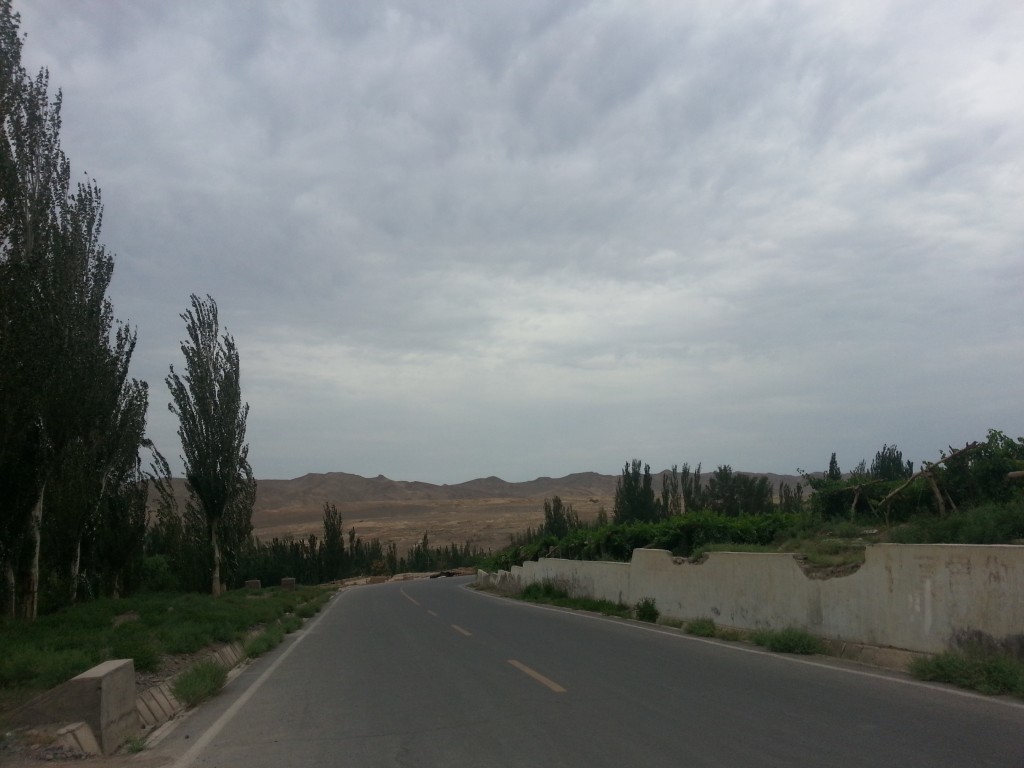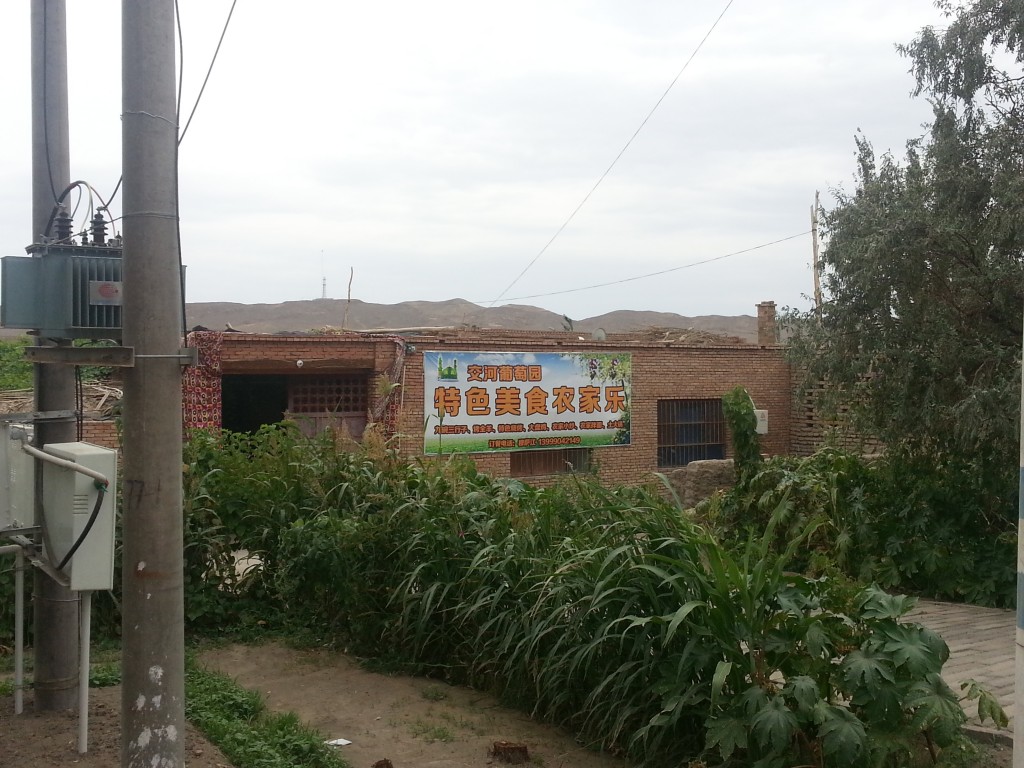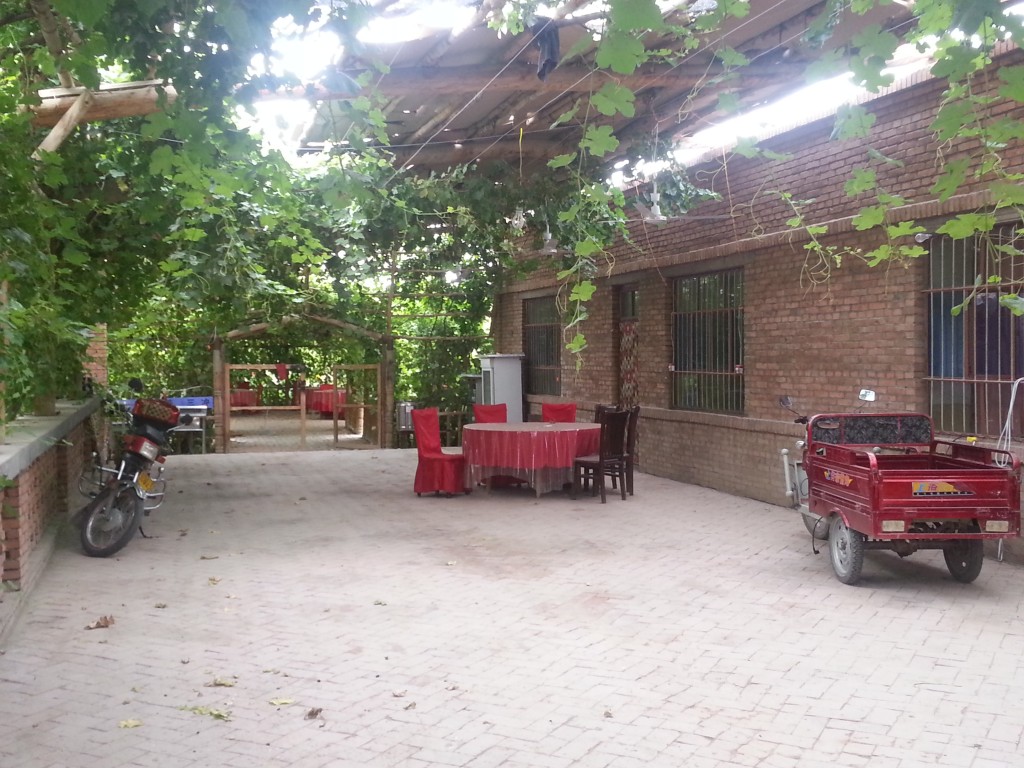The afternoon was hot. It was easily over a hundred degrees. We were in the dry, Turpan depression, near the second lowest point on Earth. My idea to bike to and back from the Jiaohe Ruins had seemed like a better idea earlier in the morning. Now, after two and a half hours wandering around the Jiaohe ruins without water, the desert was getting to us.
Bicycling alongside the never-ending grape fields, I asked several people where we could buy raisins, as a snack to tide us over until we got something to eat in town, but no one was able to say. In a sea of grapes, no one seemed to know where I could buy raisins.
The house
We passed a brick house surrounded on three sides by acres of grape vines. A sign hung on the front wall of the house, advertising that they served meals there. It was four o’clock Beijing time, two o’clock local time, but I figured they might have raisois to sell us.
I knocked on a red wooden gate which marked the entrance to the house. At first, there was no response, but soon, I heard the soft scratching of a girl’s footsteps.
She opened the door slightly, her brown face peaking out at us under her black and yellow hijab.
“Sorry to bother you, but we were wondering if you sold any raisins here,” I asked.
She did not say anything, waving us in. We stood in the atrium, and she disappeared into a side room.
I had seen diagrams of Uighur houses, but I had never gotten the chance to go into one. Behind the gate, there was a large atrium. The atrium functioned as a garage, as an area for welcoming guests and, in the summer, as a place to sleep, when the interior rooms of the house were too hot in the 110+ heat. Pressed against the wall, there was a sewing machine and a small three-wheeled cart used by farmers in China. Opposite, was a motorcycle. In the back, were several fancy looking tables, where they served guests who stopped by for lunch.
The Atrium
Like many Uighur atriums, the thing above us was not so much a roof as it was wooden poles covered in grape vines. With only half an inch of rain each year, a fully covered roof was not needed. The lush green leaves of the grape vine provided shade to keep the atrium cool while still letting in enough natural light to see.
The girl with the black and yellow hijab returned from the side room. She had no raisins, but she signaled that we should wait for a few minutes. Then, she returned to her work at the sewing machine. I realized she probably did not speak Chinese. The sewing machine hummed on and off as the girl pushed material beneath the needle. I wondered how much of what I had said she was able to understand.
We waited a few more minutes, but no one came out to sell us raisins.
“Umm… I guess we’ll just head out. Thank you very much though.” I said, unsure of what to say.
The girl stood up and grabbed a pair of vine clippers, moving slowly past us, again not saying anything. She took a small ladder and snipped off a bunch of grapes larger than my balding head, handing them to us.
“Oh, thank you.” I said, pulling out my wallet. “How much should I pay you?”
She waved away my wallet. This was a gift, she signaled.
“Oh, wow. Thank you a lot.” We had done nothing to deserve this gift. As a part of Muslim and Central Asian culture, guests are treated with a hospitality rarely seen in China or America.
We led ourselves to the wooden gate and out of the atrium where our bikes were parked. The girl in the black and yellow hijab closed the door behind us.



Quite astonishing! Again, thx for sharing and posting!
To what purpose are the grapes grown? Probably not to make wine, since it’s a Muslim country. For export? How do farmers get grapes to market?
I’ll toast you guys with a cold beer!
Tom
It is my understanding that they are largely used for making raisins, but I did have some Turpan Wine and it was very good. Islam here has long been a little less strict, but many of the Uighurs are getting stricter, as a sort of response to the ethnic tension.